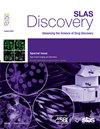MSC。传感器:捕获癌细胞与基质的相互作用,用于功能分析
IF 2.7
4区 生物学
Q2 BIOCHEMICAL RESEARCH METHODS
引用次数: 1
摘要
间充质间质细胞(MSCs)有助于调节正常和恶性造血的微环境,因此可能支持癌细胞亚群逃避治疗压力。在这里,我们设计了骨髓间充质干细胞来表达合成的CD19传感器受体,以检测和显示在共培养中相互作用的原代CD19+白血病细胞。这种实现提供了一个通用的平台,便于在共培养中对原代CD19+白血病细胞进行体外药物反应分析,具有高灵敏度和可扩展性。本文章由计算机程序翻译,如有差异,请以英文原文为准。
MSC.sensor: Capturing cancer cell interactions with stroma for functional profiling
Mesenchymal stromal cells (MSCs) contribute to the microenvironment regulating normal and malignant hematopoiesis, and thus may support subpopulations of cancer cells to escape therapeutic pressure. Here, we engineered bone marrow MSCs to express a synthetic CD19-sensor receptor to detect and display interacting primary CD19+ leukemia cells in coculture. This implementation provides a versatile platform facilitating ex vivo drug response profiling of primary CD19+ leukemia cells in coculture with high-sensitivity and scalability.
求助全文
通过发布文献求助,成功后即可免费获取论文全文。
去求助
来源期刊

SLAS Discovery
Chemistry-Analytical Chemistry
CiteScore
7.00
自引率
3.20%
发文量
58
审稿时长
39 days
期刊介绍:
Advancing Life Sciences R&D: SLAS Discovery reports how scientists develop and utilize novel technologies and/or approaches to provide and characterize chemical and biological tools to understand and treat human disease.
SLAS Discovery is a peer-reviewed journal that publishes scientific reports that enable and improve target validation, evaluate current drug discovery technologies, provide novel research tools, and incorporate research approaches that enhance depth of knowledge and drug discovery success.
SLAS Discovery emphasizes scientific and technical advances in target identification/validation (including chemical probes, RNA silencing, gene editing technologies); biomarker discovery; assay development; virtual, medium- or high-throughput screening (biochemical and biological, biophysical, phenotypic, toxicological, ADME); lead generation/optimization; chemical biology; and informatics (data analysis, image analysis, statistics, bio- and chemo-informatics). Review articles on target biology, new paradigms in drug discovery and advances in drug discovery technologies.
SLAS Discovery is of particular interest to those involved in analytical chemistry, applied microbiology, automation, biochemistry, bioengineering, biomedical optics, biotechnology, bioinformatics, cell biology, DNA science and technology, genetics, information technology, medicinal chemistry, molecular biology, natural products chemistry, organic chemistry, pharmacology, spectroscopy, and toxicology.
SLAS Discovery is a member of the Committee on Publication Ethics (COPE) and was published previously (1996-2016) as the Journal of Biomolecular Screening (JBS).
 求助内容:
求助内容: 应助结果提醒方式:
应助结果提醒方式:


